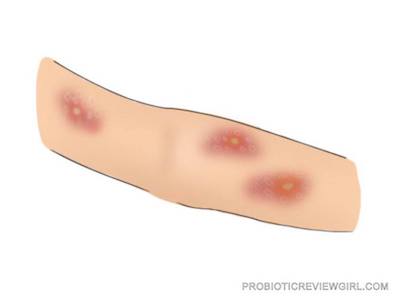Do Probiotics Help With Eczema?
Research suggests that probiotics may help assist with eczema by replenishing friendly bacteria depleted, balancing the gut microbiome, and modulating the immune response.
Probiotics are live microorganisms that, when consumed in adequate amounts, can provide health benefits by positively influencing the immune system. Eczema is an immune system reaction that produces inflammation.
Does Gut Health Affect Eczema?

Gut health may be linked together with eczema since according to research, people with eczema often have lower levels of probiotic bacteria in their microbiome according to research.
A 2018 study authored by SY Lee, found that changes in the gut and skin microbiome, known as dysbiosis, are linked to alterations in immune responses and the development of atopic dermatitis.
Dysbiosis refers to an imbalance or disruption in the composition and function of the microbial communities that naturally reside in a specific environment, such as the gut or skin.
A separate 2019 study authored by JE Kim, found that modulating the skin and gut microbiome through approaches such as probiotic supplementation or application of moisturizers containing nonpathogenic biomass may have preventive and therapeutic potential for eczema.
How Can Probiotics Help With Eczema?
Probiotics have the potential to help with Eczema by positively modulating the immune system. This is relevant in the context of helping eczema, as the condition involves inflamed, dry, cracked, and itchy skin caused by the immune system. More research is still needed to fully understand if probiotics can help and it is best to use them with conventional studied treatments.
Which Probiotics Are Best For Eczema?
The 5 best probiotic strains based on the amount of research for eczema are Lactobacillus rhamnosus HN001®, Lactobacillus salivarius LS01, Bifidobacterium lactis BB12®, Bifidobacterium breve M-16V® and Bifidobacterium lactis Bi-07.
- 1L. Rhamnosus HN001®: A 2021 study authored by K Wickens, found that this strain taken during the first 2 years of life reduced the cumulative prevalence of eczema by age 4 years. The protective effect against eczema persisted even after stopping probiotic supplementation.
- 2L. Salivarius LS01: A 2011 study authored by L Drago, found that treatment this probiotic strain significantly improved clinical parameters and quality of life in adult patients with eczema. Patients who received the probiotic showed a statistically significant improvement in and dermatology life quality index compared to the placebo group.
- 3B. lactis BB12®: A 2000 Meta-analysis authored by E Isolauri, found that supplementation with specific probiotic strains, Bifidobacterium lactis Bb-12 or Lactobacillus GG (ATCC 53103), improved the skin condition of infants with atopic eczema.
- 4B. breve M-16V®: A 2018 study authored by L Hulshof, found that this prebiotic's had a positive effect on e severity of atopic dermatitis in infants with eczema. The results showed that the scoring atopic dermatitis score, which measures the severity of Eczema, decreased over time.
- 5B. lactis Bi-07: Post hoc analysis authored by R. Gøbel, revealed a significant reduction in the severity of Atopic Dermatitis in a Bi-07 group, along with decreasing levels of IFN-γ and IL-10, indicating possible beneficial effects of this specific probiotic strain for Eczema.
Can Probiotics Make Eczema Worse?
There is no evidence to suggest that probiotics have adverse effects or make eczema symptoms worse. Probiotics are not harmful and may be used as a complementary medicine for eczema, potentially benefiting gut health and the immune system but more research is still needed as there are some conflicting sources on if probiotics can make eczema worse.
What Probiotic Strains Don't Work For Eczema?
A 2019 meta-analysis authored by H Szajewska, found that supplementation with Lactobacillus rhamnosus GG alone did not reduce the risk of eczema in children. The study did not support the general recommendation to use probiotics, specifically LGG, for the primary prevention of eczema in children. This was not the same ATCC 53103 strain mentioned previously.
Is Kefir Good For Eczema?
Kefir may be good for Eczema according to new research. Atopic individuals, especially those with AD, may benefit from the intake of kefir, particularly in terms of improved skin hydration. A 2021 study authored by E Alves found the consumption of homemade kefir improved skin condition in both healthy individuals and those with atopic dermatitis.
Kefir is a fermented dairy beverage with Lactobacillus & Bifidobacterium probiotic strains, characterized by its tangy taste and creamy texture.
Is Yogurt Good For Eczema?
There is currently no research to suggest that Yogurt is good for Eczema. Yogurt, as a fermented dairy product rich in probiotics, may be beneficial for eczema by improving the gut and skin microbiome, reducing inflammation, and supporting a strong immune system but more research is needed.
How Long Does It Take For Probiotics To Work For Eczema?
The effects of probiotics on eczema may vary among individuals but it is recommended to use probiotic supplementation for at least an 8-week period to see the best impact.
Further clinical research is needed to fully understand the potential of probiotics for eczema, but the gut-skin axis suggests their usefulness in eczema management. Probiotics should be considered as part of a supporting protocol for eczema, along with conventional treatments like emollients and steroids.
Dr. Sara Mesilhy has a Master’s degree in Gastroenterology and holds a membership with the Royal College of Physicians of the United Kingdom. She completed her Bachelor of Medicine, Bachelor of Surgery (MBBS) at Cairo University and is currently part of the ProbioticReviewGirl medical team.